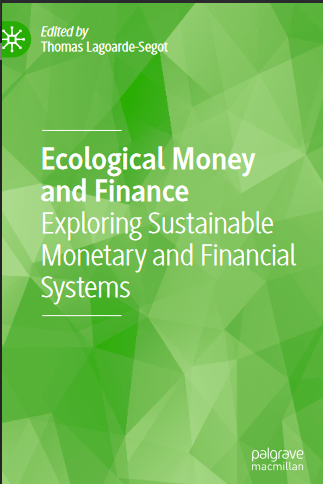موضوعات
آموزش و پرورش
ادبیات و زبان
پزشکی، دندانپزشکی و داروسازی
تاریخ و جغرافیا
داستان و رمان
دیگر
دین و فلسفه
روانشناسی
ریاضیات و آمار
سلامتی، تناسب اندام و رژیم غذایی
شیمی و پلیمر
علوم اجتماعی و حقوق
علوم زیستی و بیوتکنولوژی
فیزیک و نجوم
کامپیوتر و اینترنت
کتابهای کودکان و داستان
کسب و کار و اقتصاد
کشاورزی و دامپزشکی و غذا
معماری
مهندسی و فناوری
هنر و تئاتر
محصولات
Ecological Money and Finance - Original PDF
نویسندگان: خلاصه: v As early as 1890, the economist Alfred Marshall wrote: ‘Economic condi- tions are constantly changing, and each generation looks at its own prob- lems in its own way’. Our generation, in turn, faces particularly pressing problems: financial crises, the uncertain effects of technological change, widening income and wealth inequalities, rising public and private debts, geopolitical tensions, climate change, degradation of natural systems, etc. One particularly worrying fact is that the ‘Great Industrial Acceleration’ has now been identified as the root cause of a major disruption of the Earth system. This disruption is undermining not only the resilience of our global economy but also life on Earth. As shown in Fig. 1, a simple linear regression between global GDP and kilotons of CO2 emissions shows a correlation coefficient of 0.966. A linear regression between global market capitalization and CO2 emissions also shows a correlation coefficient of 0.960. The accumulation of monetary wealth (through GDP) thus mirrors the unaccounted destruction of ecosystem services, and the accumulation of a colossal energy and ecological debt. The rate of species extinction is now 100 times higher than the average observed over the last 10 million years. Nearly 1 million species are threatened with extinction. Compliance with the Paris Agreement—which commit to keeping global warming well below 2° by 2100—is clearly a civilizational issue that calls for a deep reorientation of our socioeconomic modeآیا کتاب مورد نظر هنوز بر روی سایت قرار نگرفته است؟ جای نگرانی نیست! کافی است بر روی گزینه سفارش کتاب کلیک کرده و درخواست خود را ثبت کنید. در کمتر از چند ساعت کتاب شما را آماده خواهیم کرد.
